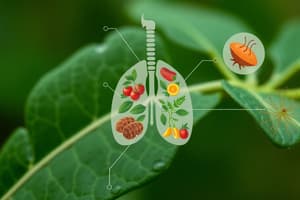Podcast
Questions and Answers
What is the primary purpose of nutrition in living organisms?
What is the primary purpose of nutrition in living organisms?
- To transport waste products
- To regulate internal body temperature
- To reproduce offspring
- To obtain and utilize food for energy and growth (correct)
Anaerobic respiration requires oxygen.
Anaerobic respiration requires oxygen.
False (B)
What is the process by which organisms maintain a stable internal environment?
What is the process by which organisms maintain a stable internal environment?
Regulation
Excretion is the process by which organisms eliminate __________ from their bodies.
Excretion is the process by which organisms eliminate __________ from their bodies.
Which of the following processes directly contributes to cellular energy production?
Which of the following processes directly contributes to cellular energy production?
Match the life process with its description:
Match the life process with its description:
Asexual reproduction results in genetically diverse offspring.
Asexual reproduction results in genetically diverse offspring.
What is the main difference between aerobic and anaerobic respiration?
What is the main difference between aerobic and anaerobic respiration?
Flashcards
Life Processes
Life Processes
Fundamental activities of living organisms to survive and reproduce.
Nutrition
Nutrition
Process of obtaining and using food for energy and growth.
Respiration
Respiration
Process that releases energy from food as ATP.
Transport
Transport
Signup and view all the flashcards
Excretion
Excretion
Signup and view all the flashcards
Regulation
Regulation
Signup and view all the flashcards
Growth
Growth
Signup and view all the flashcards
Reproduction
Reproduction
Signup and view all the flashcards
Asexual Reproduction
Asexual Reproduction
Signup and view all the flashcards
Sexual Reproduction
Sexual Reproduction
Signup and view all the flashcards
Interconnectedness of Processes
Interconnectedness of Processes
Signup and view all the flashcards
Differences in Processes Across Organisms
Differences in Processes Across Organisms
Signup and view all the flashcards
Study Notes
Defining Life Processes
- Life processes are the fundamental activities that living organisms perform to maintain their existence and reproduce.
- These processes are complex and interconnected, working together to ensure survival.
Key Life Processes
- Nutrition: The process by which organisms obtain and utilize food for energy and growth. This includes ingestion (taking in food), digestion (breaking down food), absorption (taking in nutrients), and assimilation (using nutrients). Different organisms use various methods—photosynthesis, predation, etc.
- Respiration: The process by which organisms release energy from food in the form of ATP (adenosine triphosphate). Aerobic respiration (using oxygen) and anaerobic respiration (without oxygen) are the main forms.
- Transport: The movement of substances within an organism. This includes the transport of nutrients, oxygen, waste products, and hormones. Mechanisms vary greatly between single-celled and multi-celled organisms.
- Excretion: The process by which organisms eliminate waste products from their bodies. This includes removing excess water, salts, and metabolic waste.
- Regulation: The process by which organisms maintain a stable internal environment (homeostasis). This involves coordinating various physiological functions, such as temperature, pH, and water balance.
- Growth: The irreversible increase in size and complexity of an organism. This can involve cell division, enlargement, and differentiation.
- Reproduction: The process by which organisms produce offspring. This ensures the continuation of the species. Reproduction can be sexual (involving two parents) or asexual (involving one parent).
- Asexual reproduction produces genetically identical offspring and happens quickly.
- Sexual reproduction creates genetically diverse offspring and tends to be slower.
Interconnectedness of Life Processes
- Life processes are not isolated events but rather interconnected and interdependent.
- For example, the nutrients absorbed during nutrition are used in respiration to release energy, used for growth and other life processes.
- Excretion removes waste products produced during these processes.
- Regulation tightly controls all these processes within an organism.
Differences in Life Processes Across Organisms
- The specific mechanisms and complexity of life processes vary considerably between different organisms.
- The complexity increases as one progresses from simpler to more advanced organisms, such as unicellular organisms compared to multicellular organisms.
- Even within similar organisms, their specific mechanisms can show differences depending on factors like environment and adaptations.
Importance of Life Processes
- Understanding life processes is crucial for comprehending the intricacies of living organisms.
- It leads to advancements in medicine and technology.
- Studying these processes helps us to protect and preserve various species.
- Insights gained through research on life processes improve our knowledge of ecosystems and conservation efforts.
Studying That Suits You
Use AI to generate personalized quizzes and flashcards to suit your learning preferences.



